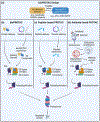Biologics-based degraders - an expanding toolkit for targeted-protein degradation
- PMID: 36179405
- PMCID: PMC9742328
- DOI: 10.1016/j.copbio.2022.102807
Biologics-based degraders - an expanding toolkit for targeted-protein degradation
Abstract
Targeted protein degradation (TPD) is a broadly useful proteome editing tool for biological research and therapeutic development. TPD offers several advantages over functional inhibition alone, including the ability to target previously undruggable proteins and the substantial and sustained knockout of protein activity. A variety of small molecule approaches hijack endogenous protein degradation machinery, but are limited to proteins with a cytosolic domain and suitable binding pocket. Recently, biologics-based methods have expanded the TPD toolbox by allowing access to extracellular and surface-exposed proteins and increasing target specificity. Here, we summarize recent advances in the use of biologics to deplete proteins through either the ubiquitin-proteasome system or the lysosomal degradation pathway, and discuss routes to their effective delivery as potential therapeutic interventions.
Copyright © 2022 Elsevier Ltd. All rights reserved.
Conflict of interest statement
Conflict of interest statement
The authors declare the following financial interests/personal relationships that may be considered as potential competing interests: James Hunt holds shares in AstraZeneca.
Figures



References
-
- Dong G, Ding Y, He S, Sheng C: Molecular glues for targeted protein degradation: from serendipity to rational discovery. J Med Chem 2021, 64:10606–10620. - PubMed
-
- Schreiber SL: The rise of molecular glues. Cell 2021, 184:3–9. - PubMed
-
- Zeng S, Huang W, Zheng X, Cheng Liyan, Zhang Z, Wang J, Shen Z: Proteolysis targeting chimera (PROTAC) in drug discovery paradigm: Recent progress and future challenges. Eur J Med Chem 2021, 210:112981. - PubMed
Publication types
MeSH terms
Substances
Grants and funding
LinkOut - more resources
Full Text Sources
Other Literature Sources

